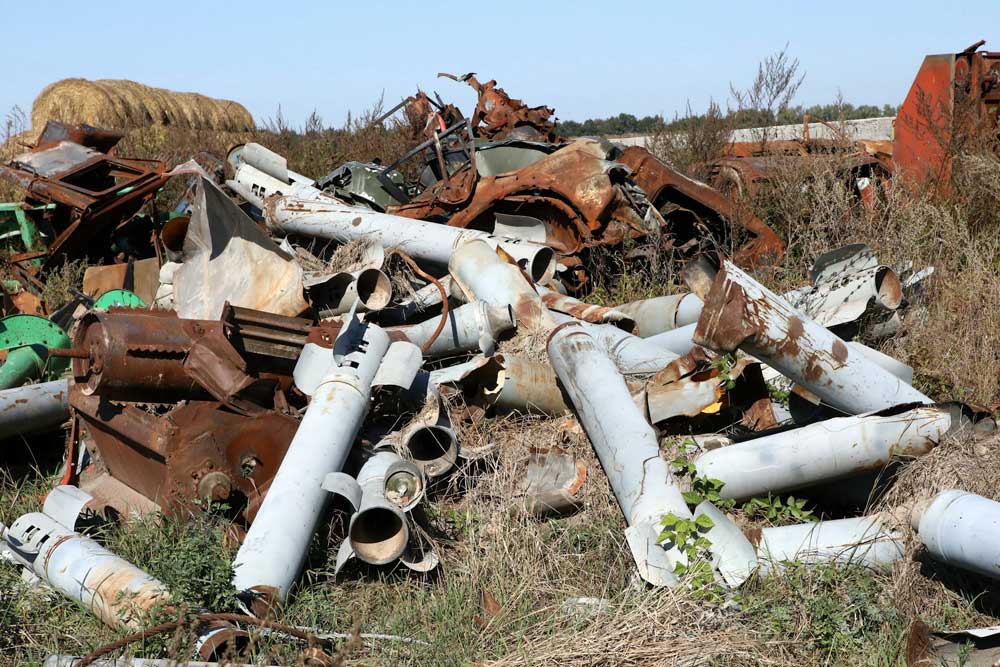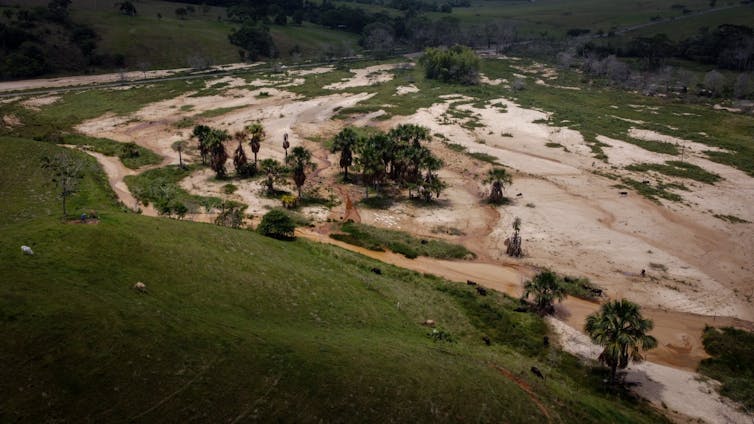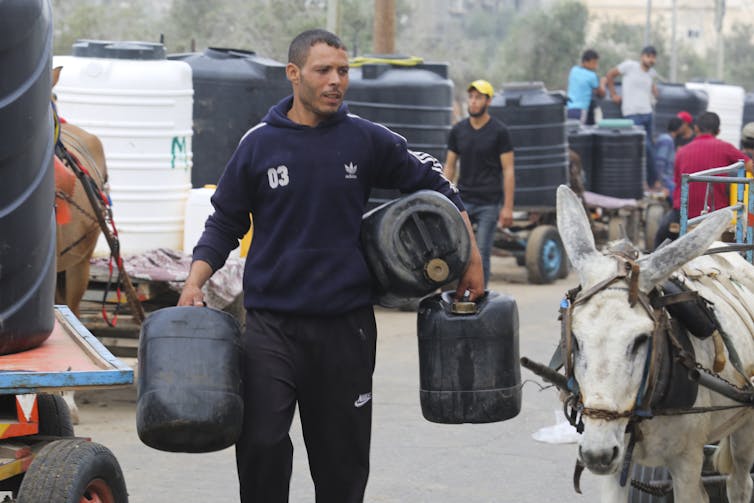
By Richard Marcantonio, Josefina Echavarria Alvarez
As wars grind on in Ukraine and Gaza, another location ravaged by conflict is taking steps to implement a historic peace agreement. From the mid-1960s through 2016, Colombia was torn by conflict between the government, leftist guerrilla movements and right-wing paramilitary groups. Now the government and rebels are working to carry out a sweeping accord that addresses many critical sectors, including environmental damages and restoration.
University of Notre Dame researchers Richard Marcantonio and Josefina Echavarria Alvarez study peace and conflict issues, including their effects on the environment. They currently are advising negotiations between the Colombian government and several rebel factions over wartime damage to soil, water and other natural resources. They explain that while Colombia’s transition from war to peace has been difficult, the accord offers a model for addressing the ravages of war in places such as Gaza and Ukraine.
Is it common for peace settlements to address environmental harm?
Few agreements include environmental provisions, and even fewer see them carried out, even though research shows that many drivers of conflict can be directly or indirectly related to the environment.
We work with a research program at the University of Notre Dame called the Peace Accords Matrix, which monitors the implementation of comprehensive peace accords in 34 countries worldwide. Only 10 of the accords have natural resource management provisions agreements, and these typically have not triggered major steps to protect the environment.

Juancho Torres/Anadolu Agency via Getty Images
How is the Colombia accord different?
Colombia’s is seen as the most comprehensive peace accord that has been signed to date. It considers issues ranging from security to social justice and political participation, in great detail.
The accord acknowledges that a peaceful postwar society requires not only respect for human rights but also “protection of the environment, respect for nature and its renewable and nonrenewable resources and biodiversity.” More than 20% of the commitments in the agreement have an environmental connection.
They fall into four main categories:
– Adapting and responding to climate change
– Preserving natural resources and habitats
– Protecting environmental health through measures such as access to clean water
– Process issues, such as ensuring that communities can participate in decisions about rural programs and resource management
There also are gaps. For example, many protected areas have been deforested for ranching and coca production in the postaccord period. And there are no provisions addressing toxic pollution, an issue other agreements also neglect.
Often there are power vacuums during transitions between war and peace, when government agencies are working to reestablish their operations. Natural resources and environmental health need protection during these phases.
In Sierra Leone, for example, resource extraction by foreign companies drastically ramped up immediately after the Lome Peace Agreement eventually ended that nation’s civil war in 2002. Companies exploited a lack of governance and support in the rural areas and often mined metals illegally or hazardously without any regulatory oversight. Today these areas still struggle with mining impacts, including contaminated drinking water and fish, the primary protein source in the area.
What is the environmental toll of war in Ukraine?
The damage is vast: There’s air, water and soil contamination, deforestation and enormous quantities of waste, including ruined buildings, burned-out cars and thousands of tons of destroyed military equipment. Russia’s destruction of the Kakhovka Dam flooded villages, destroyed crops and wrecked irrigation systems.
The cost estimates are staggering. A joint commission of the World Bank, the government of Ukraine and other institutions currently estimate direct damages at roughly US$152 billion.
In addition, cleaning up sites, rebuilding infrastructure and other repairs could cost more than $486 billion over the next decade, as of late 2023. That figure rises every day that the war continues.
There’s broad interest in a green and sustainable reconstruction that would include steps like using sustainable building materials and powering the electricity grid with renewable energy. President Volodymyr Zelenskyy has been adamant that Russia must pay for the damage it has caused. It’s still unclear how this would work, although some U.S. and European lawmakers support seizing frozen Russian assets held in Western banks to help cover the cost.
There is a legal basis for holding Russia accountable. In 2022, the U.N. General Assembly adopted a set of principles for protecting the environment during armed conflicts. Among other existing statutes, they draw on a protocol to the Geneva Conventions of 1949 that prohibits using “methods or means of warfare which are intended, or may be expected, to cause widespread, long-term and severe damage to the natural environment.”
There has been only modest discussion so far of how to integrate these principles into a formal peace agreement between Ukraine and Russia. But a working group that included Ukrainian and European Union officials and former leaders from Sweden, Finland, Ireland and Brazil has recommended a framework for addressing environmental damage and holding perpetrators accountable.
What environmental impacts are known or asserted in Gaza?
Environmental damage in Gaza also is devastating. The U.N. estimated in early 2024 that over 100,000 cubic meters (26 million gallons) of untreated sewage and wastewater were flowing daily onto land or into the Mediterranean Sea.
Gaza’s drinking water system was insufficient before the war and has been further weakened by military strikes. On average, Gazans now have access to about 3 liters of water per person per day – less than 1 gallon.
Thousands of buildings have been destroyed, spreading hazardous materials such as asbestos. Every bomb that’s dropped disperses toxic materials that will persist in the soil unless it’s remediated. Simultaneous environmental and infrastructure impacts, such as water and power shortages, are contributing to larger crises, such as the collapse of Gaza’s health care system, that will have long-lasting human costs.

AP Photo/Hatem Ali
How can future peace accords address these impacts?
Integrating the environment into peace accords isn’t easy. Resources such as energy, clean soil and water are vital for life, which is precisely why military forces may seek to control or destroy them. This is happening in both Ukraine and Gaza.
Peace negotiators tend to focus on social, political and economic issues, rather than environmental reparations. But leaving environmental damage unresolved until after a peace accord is signed keeps people who have been displaced and marginalized by conflict in precarious positions.
It may even cause fighting to resume. According to the U.N. Environment Program, at least 40% of all wars within states in the past 60 years have had a link to natural resources. In those cases, fighting was twice as likely to resume within five years after conflict ended.
We see some lessons for future negotiations.
First, it’s important for accords to recognize environmental harm as one of war’s main consequences and to acknowledge that a healthy environment is essential for sustainable livelihoods and peace.
Second, connecting environmental provisions with other issues, such as rural reform and political participation, can create better, more sustainable and equal conditions for reestablishing democracy. The Colombia accords are an example.
Third, it is important to clearly define goals, such as what infrastructure and institutions need to be rebuilt, who is in charge of getting those tasks done, and the timetable for doing it. This can help ensure that environmental restoration doesn’t become a secondary goal.
Fourth, the international community has an important role to play in monitoring and verifying environmental restoration and providing financial and technical support. Foreign donors have already pledged $66 billion for rebuilding Ukraine and have said that they will require grantees to follow strict environmental standards in order to receive financing.
Reconstructing nations and simultaneously regenerating communities and ecosystems after wars is a daunting mission, but it’s also an opportunity to build something better. We see Ukraine and Gaza as potential test cases for addressing war’s toll on the environment and creating a more sustainable future.
![]()
Richard Marcantonio is Assistant Professor of Management and Organization at the University of Notre Dame; Josefina Echavarria Alvarez is Professor of the Practice in International Peace Studies at the University of Notre Dame.






























Joe D says
MAN…in the general “SPECIES” sense, has never taken care of this planet with which we have been blessed. MAN is the only “animal” given FREE WILL ( instead of having just “instinct”)…however, MAN is the ONLY “animal” that trashes its own environment (air pollution /water exhaustion/fossil fuel burning/ deforestation/ strip mining /landfills). We’re collectively treating our PLANET like it can bounce back from ANYTHING we throw at it…for centuries. It CANNOT
The fact that the air pollution levels improved so much during Covid shutdowns ( especially in RUSSIA and CHINA industrial areas), tells us it’s not TOO LATE to reverse. However GREED and THIRST FOR POWER ( in every form) has become the priority, as if this planet we live in is DISPOSABLE (it is not). I DID read recently that astronomers have discovered a distant planet that LOOKS like it has the conditions to support human life…so I guess we might have a SPARE planet to mess up after all.
I’m old enough to have been alive for the FIRST EARTH DAY (April 22, 1970). We walked to school (3 miles!…IMAGINE asking your 10th grader to walk 3 miles today)..one student rode her horse. The day was filled with CONSERVATION focused lessons in each subject. It was a BIG DEAL…now it seems to pass by each year with hardly a mention.
There was a Disney Animated Movie released in the early 2000’s (?). WALL*E (Waste Allocation Load Lifter * Earth class). It was about a garbage collecting robot who was left behind on EARTH when there was so much pollution, that the human race blasted off to space to wait to see when (if) the EARTH could renew itself.
WALL*E was the only thing left behind to clean up the mess…ALONE! That is until one day a retrieval robot (EVA)…is sent back to Earth to check to see if it can sustain life….WALL*E falls in love! He gives EVA ( who isn’t too thrilled with him) his precious GIFT…a plant sprout he found. EVA (responding to her programming ) takes the plant, and signals that “she” has found “life” on Earth….and starts to leave…WALL*E stows away on the ship…he can’t BARE to lose EVA…..
I won’t give away the rest of the movie plot. Suffice it to say, even as an ANIMATED movie Governor Ron would call it “WOKE,” and PROBABLY try to ban it (definitely ban it in libraries and schools. It was such a profound movie (yes)… I bought the DVD (remember those in the “BLOCKBUSTER” movie rental days)? I still have it!
Despite our “Illustrious” rulers’ writing Climate Change out of Florida LEGISLATION, it not GOING AWAY.